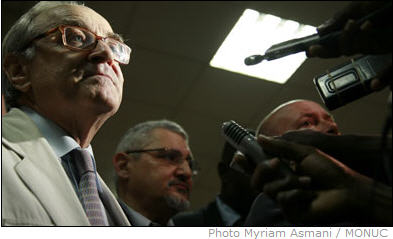 Following their arrival in Kinshasa on Tuesday night June 19 2007, the UN Security Council delegation have met this morning with President Joseph Kabila and acting Prime Minister Mr. Nzanga Mobutu, as well as the Ministers of Foreign Affairs, Justice, the Interior, Human Rights and Planning.
Following their arrival in Kinshasa on Tuesday night June 19 2007, the UN Security Council delegation have met this morning with President Joseph Kabila and acting Prime Minister Mr. Nzanga Mobutu, as well as the Ministers of Foreign Affairs, Justice, the Interior, Human Rights and Planning.
This afternoon June 20 2007, they plan to meet the members, political groups and presidents of both the Senate and the National Assembly, before departing for New York this evening.
The visit to the DRC marks the last stage of an African tour to Addis-Abeba (Ethiopia), Khartoum (Sudan), Accra (Ghana) and Abidjan (Ivory Coast). The delegation was welcomed on its arrival in the DRC by William Swing, MONUC head and UN Special Representative to Secretary General, the DRC foreign minister and Congolese authorities, members of the diplomatic corps and senior United Nations staff in Kinshasa.
Upon their arrival, Jean Marc de la Sablière, head of the Security Council delegation, gave a brief declaration to the press, in which he said it was the eight visit of the Council to the country.
“My first words are to congratulate the Congolese, to congratulate them for the political maturity which they showed at the crucial stage of the elections, which allowed them to finally emerge from crisis and the transition. It was a crucial stage, but only a stage, in the reconstruction of the country. There are now new challenges that are a matter for the Democratic Republic for Congo to strengthen what has been made, to create a strong democratic society on the basis of these elections.”
He went on to say that the Security Council, in adopting resolution 1756, prolonged the MONUC mandate until the end of the year, at the same troop and staff levels.
“It proves that we wish to remain beside the Congolese. I would like to conclude by paying homage to MONUC's work, because I think it has done a lot, in the name of the international community and the service of the Congolese people, during this period.”
“Therefore, we come to talk as the resolution is being put in place, we will speak of security problems in the east of the country, of security sector reform, of governance, and a lot of other topics. And we will do this in partnership, with the full respect of the sovereignty of the Democratic Republic of Congo, our partner. It means that we each have our demands and each must bring his ideas to the table,” he concluded.
Related articles
- • Felix Tshisekedi Sworn In as DR Congo President (January 24, 2019)
- • Constitutional Court Declares Tshisekedi Winner of Presidential Election (January 19, 2019)
- • Felix Tshisekedi Vows to Be the President of All Congolese (January 10, 2019)
- • Felix Tshisekedi Elected DR Congo President (January 10, 2019)
- • DR Congo Delays Results of December Election (January 6, 2019)
- • Botswana Urges Joseph Kabila to Step Down (February 26, 2018)
- • No elections in DR Congo in December without electronic voting machines: INEC (February 13, 2018)
- • US Warns DR Congo Against Electronic Voting for Delayed Election (February 12, 2018)
- • Felix Tshisekedi accuses INEC of illegally prolonging Kabila's mandate (October 24, 2017)
- • DRC Seeks Arrest of Presidential Candidate Moise Katumbi (May 19, 2016)
- • Papa Wemba Is Buried in Kinshasa (May 4, 2016)
- • Papa Wemba Awarded Highest National Honor as Thousands Pay Tribute (May 2, 2016)
- • Rights Groups: DR Congo Must Free Pro-democracy Activists (April 13, 2015)
- • Police Open Fire on Crowd Protesting Election Law Change (January 19, 2015)
- • Etienne Tshisekedi Evacuated to Belgium for Medical Treatment (August 16, 2014)
- • Kerry Calls on Kabila to Honor Constitution (May 4, 2014)
- • Kerry in DR Congo for Security Talks (May 3, 2014)
- • DR Congo Takes Chairmanship of COMESA at Summit in Kinshasa (February 26, 2014)
- • DR Congo Honors Nelson Mandela, Hero and Model for Humanity (December 6, 2013)
- • Kabila Congratulates Congo Army for Defeating M23 Rebels (October 30, 2013)
- • DR Congo Eases Process for Starting a New Business (June 3, 2013)
- • Regional Leaders Sign DR Congo Peace Deal (February 24, 2013)
- • The M23 Rebels Want to Overthrow Kabila? Nonsense (November 28, 2012)
- • Thousands of Women March Against M23 Rebels in Kinshasa (November 24, 2012)
- • Protests Against M23 Rebels, Government and UN Spread (November 22, 2012)
- • Thousands Protest M23 Capture of Goma, Turn on Government and UN (November 21, 2012)
- • DR Congo Officials Vow to Defend Goma Against M23 Rebels (November 19, 2012)
- • At high-level meeting, Ban urges political solution to crisis in eastern DR Congo (September 27, 2012)
- • US Cuts Military Aid to Rwanda Over Support to Rebels in DR Congo (July 21, 2012)
- • DR Congo, Rwanda Sign Pact to Fight Rebels in Eastern Congo (July 15, 2012)







